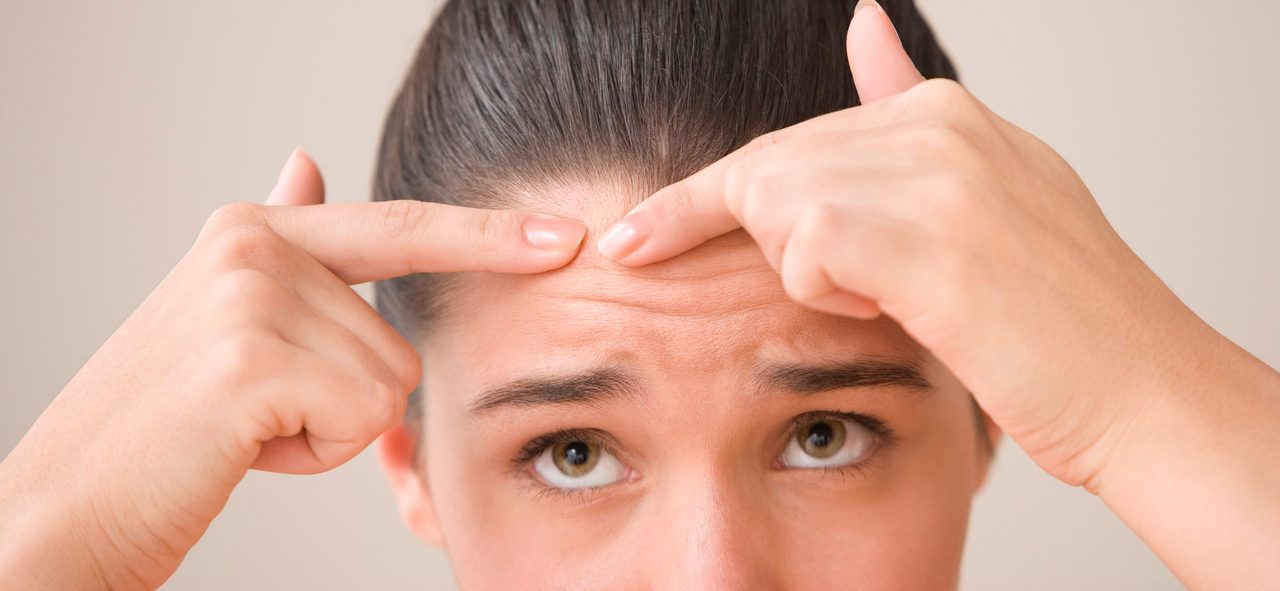Hormonal Acne Treatment

Acne isn’t just a teen problem. Many adult women have acne due to hormone changes. Hormonal acne treatment can clear breakouts and help prevent new ones.
Acne is a chronic inflammatory disorder of the skin. It can cause a single bump here and there or multiple blemishes — typically appearing on the face and neck and sometimes on the chest, back, and upper arms, too.
The blemishes are not the result of eating greasy food, sweating, or poor hygiene. Those supposed causes of acne are myths, according to dermatologist and FDA medical officer Jane Liedtka, MD.
While genetics may play some role in who has significant acne, and the acne-causing bacterium Propionbacterium acnes (P. acnes) is a factor, hormone fluctuations often play a major role in triggering acne.
YOU MIGHT ALSO LIKE: How to Get Clearer Skin
Understanding hormonal acne
In medical terms, acne is a disease of pilosebaceous units (PSUs), the FDA explains. PSUs (located in greatest numbers on the face, upper back, and chest) are composed of the hair shaft, hair follicle, sebaceous glands (which secrete the skin and hair lubricating oily substance called sebum), and the erector pili muscle, which causes hair to stand on end when the muscle contracts.
Hormones are known to influence PSUs in multiple ways that result in plugged pores and acne. For example, sex hormones called androgens increase in both boys and girls during puberty and cause sebaceous glands to enlarge and pump out excessive sebum. Then skin cells become abnormally sticky when they shed, clogging hair follicles and promoting acne, according to the American Academy of Dermatology.
While about 80 percent of people between the ages of 11 and 30 have acne outbreaks at one time or another, acne is not strictly a skin problem for tweens, teens, and young adults, the National Institute of Arthritis and Musculoskeletal and Skin Diseases notes. For some, acne persists into their 40s and 50s.
Both women and men can have adult acne, but hormonal acne is most likely to affect women. Hormonal changes related to pregnancy can trigger acne in women, and so can starting or stopping birth control pills, according to the FDA. Falling estrogen levels may increase the risk of acne around menopause. And women with Polycystic Ovary Syndrome (PCOS), a hormonal disorder marked by higher than normal levels of androgens, often have adult acne, too, the PCOS Awareness Association points out. In boys, testosterone levels increase during puberty, which can increase sebum production at the base of hairs and can cause acne.
The good news is hormonal acne treatment can effectively clear acne breakouts and help prevent them in the future.
See a dermatologist for persistent acne
Whether your teen is suffering from acne or you are an adult with new or persistent breakouts, it’s important to talk to your doctor if over-the-counter acne skin treatments aren’t effective.
Pediatricians and family doctors can help with mild cases of acne, but the Centers for Disease Control and Prevention (CDC) advises diagnosis and treatment by dermatologists, especially if acne is severe. While hormonal acne treatment can be very effective, it needs to be geared toward each individual’s case.
For instance, if a woman is trying to conceive or is pregnant, she shouldn’t use oral or topical medication for breakouts without a doctor’s specific approval, the American Academy of Dermatology warns. In addition, dry skin is common in adult women, and certain topical acne medications may cause their skin to be irritated. Likewise, a woman with rosacea (a common skin condition marked by redness and inflammation) who also has acne may not be able to tolerate some topical acne treatments.
Hormonal acne treatment is varied but effective
In acne patients of any age, dermatologists may use topical retinoids (medications made with vitamin A derivatives) as first-line therapy for mild-to-moderate acne with inflammation, blackheads, and whiteheads. Topical retinoids are also used to prevent new acne.
Birth control pills alter levels and activity of acne-triggering hormones and are an effective hormonal acne treatment for many women, either when used alone or with anti-androgen medication, such as spironolactone. Hormonal therapy, including birth control pills, may be contraindicated in some women, depending on their medical history — so your doctor will go over your medical history carefully before prescribing any hormonal acne treatment, the American Academy of Dermatology explains.
More is not better with topical acne medications (a pea-sized amount for the face, forming a thin layer, is best). Excessive amounts won’t produce better results and can cause irritation and dry skin.
“With acne, it’s important for patients to understand that there are no quick fixes, and none of the therapies used to treat acne work overnight,” dermatologist Bethanee Jean Schlosser, MD, PhD, director of the Women’s Skin Health Initiative at Northwestern University, explained. “Patients need to be consistent when using their acne medications and realize that they may not see the full effects of their treatment regimen for eight to 10 weeks — and in many cases, some type of maintenance therapy is required for long-term clearance.”
Self-help hormonal acne treatment tips:
- Use mild cleansers twice a day.
- Avoid squeezing, popping, and other manipulation of acne lesions to reduce the risk of scarring and secondary bacterial infections.
- Read labels: Avoid skin care products and cleansers with scrubbing particles or gritty texture (they can irritate skin).
- Use a daily moisturizer with a label stating it is non-comedogenic (non-pore clogging).
Updated:
March 22, 2019
Reviewed By:
Janet O’Dell, RN